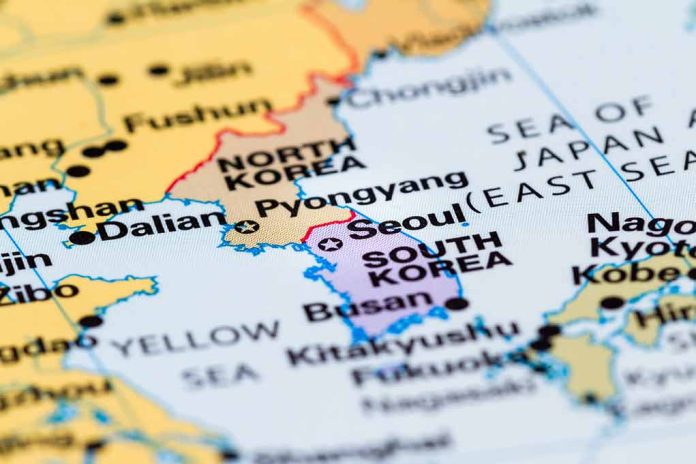
The international community watches, sometimes stunned, as tensions between North Korea and South Korea continue to escalate. At times, the two countries seem like children trading taunts, especially when it comes to papering each other with propaganda or flying garbage-filled balloon. Now, the moves are more brazen than ever, with soldiers crossing the same borders they’re well known for monitoring. So what’s next? Let’s take a closer look at the ongoing issue.
In a series of alarming incidents, North Korean soldiers have repeatedly crossed the heavily fortified border into South Korea, prompting warning shots from South Korean forces. These incursions, occurring in mid-June 2024, have reignited concerns about the fragile state of relations between the two nations and the potential for escalation in the Korean Peninsula.
On June 18, 2024, between 20 and 30 North Korean soldiers crossed the military demarcation line in the Demilitarized Zone (DMZ), venturing approximately 20 meters into South Korean territory (Al Jazeera, 2024). This incident, the second of its kind in just over a week, led to South Korean forces firing warning shots and broadcasting alerts to compel the North Korean soldiers to retreat.
The South Korean Joint Chiefs of Staff (JCS) reported that the North Korean soldiers quickly withdrew after the warning shots were fired. While the incursion was brief, it underscores the persistent tensions that exist along one of the world’s most heavily militarized borders.
These border crossings come at a time of heightened tensions between North and South Korea. Both nations have recently declared that they are no longer bound by a 2018 military agreement aimed at reducing tensions along the border. This shift in stance has led to increased military activity on both sides, with North Korea reportedly fortifying its side of the border by adding anti-tank barriers and mines.
The construction work being carried out by North Korean forces along the border appears to be part of a broader strategy to strengthen control over their troops and civilians. South Korean military officials have noted that these efforts may be aimed at preventing defections, a persistent concern for the North Korean regime.
However, the intensified border fortification efforts have come at a cost. Reports indicate that North Korean soldiers have suffered casualties due to landmine explosions during the construction process. Despite these setbacks, the work has continued unabated, highlighting the regime’s determination to maintain its grip on power.
While South Korean authorities believe that these recent border crossings were unintentional, likely due to poor visibility caused by overgrown vegetation in the DMZ, the incidents serve as a stark reminder of the potential for miscalculation and conflict in this volatile region.
The DMZ, established after the 1950-1953 Korean War, is a 248-kilometer-long, 4-kilometer-wide strip of land that serves as a buffer between North and South Korea. Despite its name, it is one of the most heavily fortified borders in the world, with an estimated two million landmines, barbed wire fences, and thousands of troops on both sides.
These recent border incidents coincide with increasing international concern over North Korea’s deepening relationship with Russia. Following North Korean leader Kim Jong Un’s visit to Russia in 2023, there have been growing fears about potential military cooperation between the two nations. The United States and South Korea have expressed alarm over the possibility of North Korea supplying missiles to Russia for use in its ongoing conflict in Ukraine.
As tensions continue to simmer, the international community watches closely for any signs of further escalation. The repeated border crossings, coupled with the breakdown of previous agreements aimed at reducing military tensions, paint a worrying picture of the current state of inter-Korean relations.
From a conservative perspective, these incidents underscore the need for a firm and resolute stance in dealing with North Korea. The regime’s ongoing nuclear and missile programs, combined with its willingness to flout international norms and agreements, pose a significant threat to regional stability and global security.
The United States and its allies must maintain a strong deterrent posture while also exploring diplomatic avenues to address the underlying issues driving tensions on the Korean Peninsula. This approach should include continued economic pressure through sanctions, enhanced military cooperation with regional partners, and a clear commitment to defending South Korea and other allies in the region.
At the same time, it is crucial to remain vigilant against the potential for miscalculation or unintended escalation. The dense vegetation and complex terrain along the DMZ create conditions where even minor incidents could quickly spiral out of control. Clear communication channels and established protocols for managing such incidents are essential to prevent unintended conflicts.
As we move forward, it is clear that the situation on the Korean Peninsula remains fraught with danger. The recent border crossings serve as a stark reminder of the ongoing challenges in maintaining peace and stability in this volatile region. A strong, principled approach, combining diplomatic engagement with a credible deterrent, remains the best path forward in addressing the persistent threat posed by North Korea.
In conclusion, while these recent incidents may have been unintentional, they highlight the precarious nature of peace on the Korean Peninsula. As tensions continue to simmer, it is imperative that the international community remains united in its approach to North Korea, balancing firm resolve with strategic patience in the pursuit of long-term stability and security in Northeast Asia.
It feels a bit like we’ve been watching tensions between North Korea and South Korea escalate for ages now. Do you believe either will make a bold move anytime soon, or will they simply continue to taunt each other? We’d love to know what you think — send us an email anytime.
Reactions from Around the Web:
Current Report reiterates that tensions escalated after the garbage balloon incident:
South Korean troops fired warning shots after North Korean soldiers briefly crossed land border.
The border-crossing incident came amid rising tensions over North Korea’s recent launches of trash-carrying balloons. pic.twitter.com/rtcPSpJXU1
— Current Report (@Currentreport1) June 11, 2024
Quote of the Day:
“It is well that war is so terrible, otherwise we should grow too fond of it.” ~Robert E. Lee





